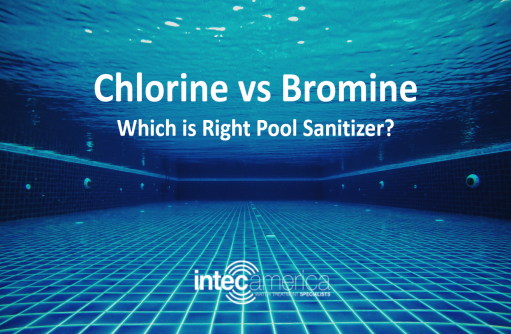A backyard with a swimming pool is one of the best places to spend time in summer. Having a pool inside your home not only increases its value, but also offers several health benefits such as reduced stress and anxiety, daily aerobic exercise, and so on. Taking a series of dips in the swimming pool and completing the entire length is one of the best options for cooling off in summers. However, it is important to keep a swimming pool clean and prim. If not maintained properly, it becomes a breeding ground for bacteria, germs, and various other contaminants. This is where the swimming pool sanitation and treatment gain significance. There are several pool sanitation techniques in use today, with chlorine and bromine treatment being the most recognized of them. Now you may ask, which one is right to clean a swimming pool or spa? This post discusses both pool sanitation techniques in detail. So, stay tuned.

A Few Points of Difference Between Chlorine and Bromine
Chlorine (Cl) and bromine (Br) are the most widely available chemicals used for pool sanitation and treatment. Both are halogens and belong to the same chemical family. With the following pointers, you will easily understand the significant differences between them. So, let’s have a look at them.
- Water Transparency: Chlorine has been widely used as an oxidizer for several years, and is known to inhibit the growth of bacteria and organic debris. It also helps remove body oils from water and helps keep the pool water sparkling clear. Bromine is less efficient at removing organic matter, leading the pool water to a cloudier appearance.
- Shock Treatment: Chlorine and bromine work way differently. Chlorine acts as both a sanitizer and an oxidizer. It is a fast-acting chemical when added to pool water during shock treatment. Meaning, it quickly combines with the germs and bacteria and deactivates them. For a pool water treatment, you need to add chlorine every alternate day or so. On the other side, bromine acts as only a sanitizer. It takes time to activate when added to the pool water, but it remains active after killing the bacteria. Unlike chlorine, you need to add this chemical once a week.
- Temperature: Compared to chlorine, bromine works better at high temperatures. Bromine remains stable above 75°F, while chlorine effectively works below 65°F. This makes chlorine a better choice for an unheated pool, while spas and hot tubs will be better served by the use of bromine.
- Sun Exposure: Both chlorine and bromine easily break down when exposed to ultraviolet radiation. While chlorine is can be stabilized by adding cyanuric acid, there is no substance that stabilizes bromine to prevent UV degradation.
- Health Issues: Irritation and allergic reactions can occur after exposure to both chlorine and bromine. However, according to the national swimming pool foundation (NSPF), bromine is better for individuals with sensitivities. It does not emit a strong smell like chlorine and its byproducts like chloramines. But due to its stability, it’s harder to rinse off your skin after a swim.
- Application: Chlorine can be applied to pool water in three ways – tablets, liquid, and granules. Liquid and granules can be directly added to water without using specialized equipment. And, the tablets are dispensed through a floating feeder to maintain the chlorine level in the water. On the other hand, bromine is placed in a floating or cartridge dispenser.
All said and done, chlorine and bromine both have their pros and cons. But both these increase the density of water and are not suitable for everyone. There are better techniques to keep your pools clean without adding chlorine or bromine. One of the best solutions is copper ionization. This is NASA’s patented technology marketed by Intec America. The company offers water treatment solutions for swimming pools, spas, and more.
Recent Blog Posts
What is the Best Chlorine-free Treatment for Your Swimming Pool?
Pool Chlorine Shortage in 2021 and Effective Chlorine-free Pool Alternatives
Hot Tub Chlorine Alternatives: What is Right for You
9 Healthier Alternatives to Chlorine for Swimming Pools
Chlorine Alternative for Swimming Pools
Are You Sensitive to Swimming Pool Chemicals
How to Prepare Your Swimming Pool for Summer?
How Often Should You Test Your Pool Water?
Benefits and Challenges of Owning a Swimming Pool or Spa
How to Prepare Your Pool for a Best At-Home Staycation?


